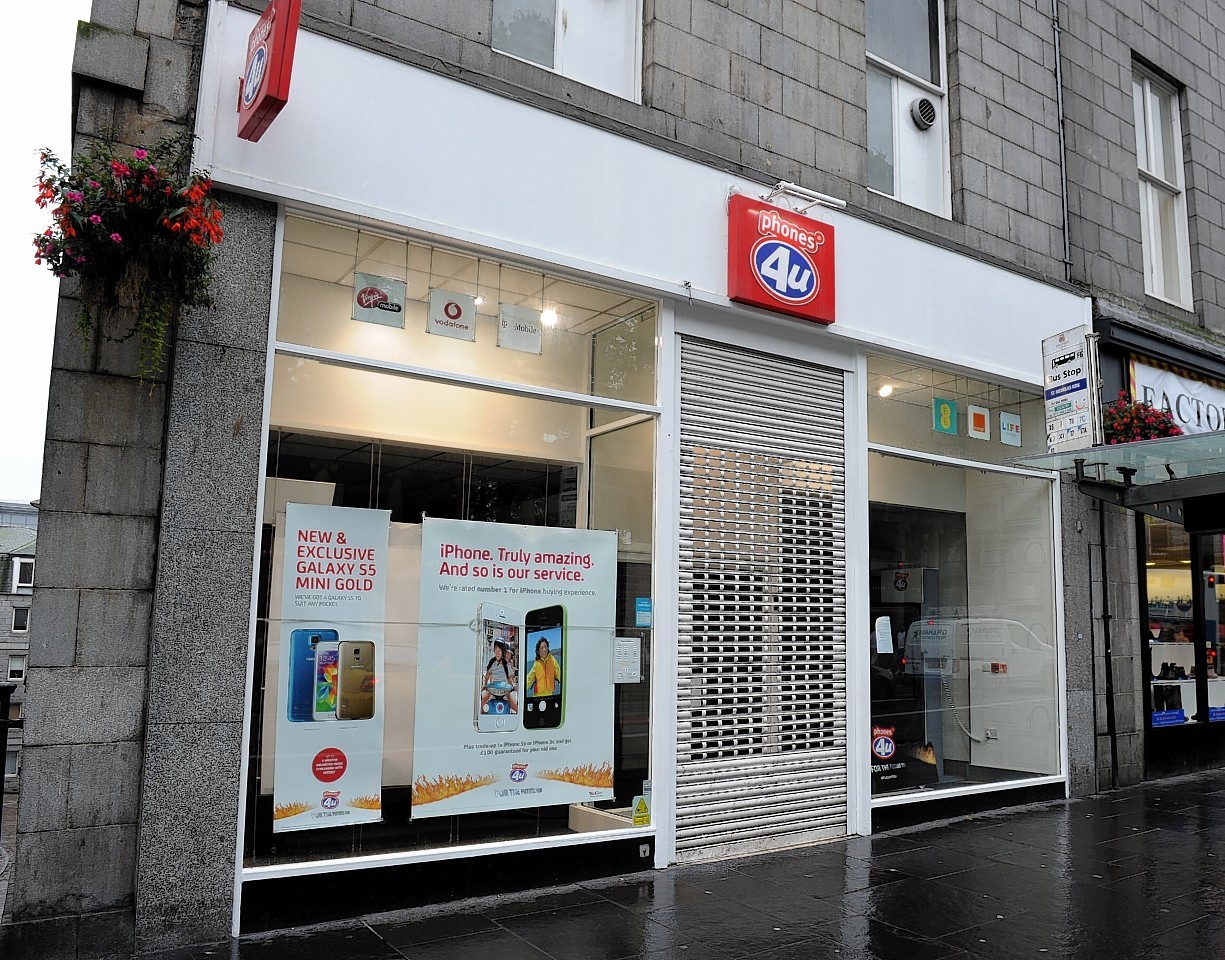Dozens of jobs have put in jeopardy in the north after Phones 4u stores were closed yesterday.
Employees of the firm in Inverness, Elgin and Aberdeen were hanging by a thread as administrators began talks on whether any stores can re-open.
The retail chain said it would have no choice but to appoint administrators and close over 500 stores across the UK after a shock decision by EE to join Vodafone in cutting ties with the retailer, which sells contracts on behalf of the network operators.
The fate of all 5,600 staff looks bleak pending a decision by administrators from PwC on whether the private equity-owned business can be reopened for trading.
The corporate restructuring team from PwC said it was hopeful that it will be able to pay all the outstanding wage arrears but that this was dependent on accessing funds to pay for the costs of the business.
PwC partner Rob Hunt said: “Our initial focus will be to quickly engage with parties who may be interested in acquiring all or part of the business, and to better understand the financial position and options for the company. The stores will remain closed while we have these conversations.
“We will also be talking to network operators and suppliers, and trying to access funds to pay for the costs of the business, including wages.”
The company is owned by private equity firm BC Partners, which last year received a one-off dividend of £200 million from the Phones 4u business.
Entrepreneur John Caudwell, who set up the operation in the 1980s before selling it for £1.5billion in 2006, said he was “sickened and saddened” for the nearly 6,000 staff who work at the Staffordshire-based firm.
In an interview at the weekend, he blamed the “ruthless behaviour” of the network operators for the demise of the business.
Phones 4u said the decision by EE not to renew its current contract, which is due to end in September next year, came as a “complete shock” and meant it would be left without a single network partner after Vodafone said earlier this month that it would not extend its agreement.
The company is owned by private equity firm BC Partners and has 550 standalone stores.
Phone operators are increasingly targeting sales through their own stores while Phones 4u’s rival Dixons Carphone – created from Carphone Warehouse and the company behind PC World and Currys – has been successful in building relationships with the phone operators.
Phones 4u said that both EE and Vodafone had, until very recently, indicated that they saw Phones 4u as a long-term strategic partner.
Stefano Quadrio Curzio, a representative of BC Partners, said: “Vodafone has acted in exactly the opposite way to what they had consistently indicated to the management of Phones 4u over more than six months.
“Their behaviour appears to have been designed to inflict the maximum damage to their partner of 15 years, giving Phones 4u no time to develop commercial alternatives.
“EE’s decision on Friday is surprising in the context of a contract that has more than a year to run and leaves the board with no alternative but to seek the administrator’s protection in the interests of all its stakeholders.”
But Vodafone said it rejected any suggestion that it behaved inappropriately during its negotiations with Phones 4u.
It said: “Phones 4u was offered repeated opportunities to propose competitive distribution terms to enable us to conclude a new agreement, but was unable to do so on terms which were commercially viable for Vodafone in the current UK market conditions.
“We were told by the Phones 4u management team that they had little commercial flexibility due to their debt repayment obligations, but that they had a number of alternative strategies in place if we couldn’t reach an agreement with them.”
EE said its decision not to renew its contract in September 2015 was in part driven by uncertainty over the long-term viability of Phones 4u.
The Vodafone tie-up with Phones 4u represented some £212million of sales and about £18.5million of earnings in the year to July 31. Overall group turnover was more than £1billion, with earnings of £105million in 2013.
The process of appointing PwC as an administrator was taking place today.
All mobile contracts bought through Phones 4u will remain unaffected and the networks will continue to provide mobile services to customers.
Phones 4u chief executive David Kassler said last night: “If the mobile network operators decline to supply us, we do not have a business. A good company making profits of over £100million, employing thousands of decent people has been forced into administration.
“The great service we have provided should have guaranteed a strong future, but unfortunately our network partners have decided otherwise. The ultimate result will be less competition, less choice and higher prices for mobile customers in the UK.”
Neil Saunders, managing director of retail consultancy Conlumino, said: “The example of Phones 4u is perhaps a salutary lesson to all retailers that they should be beware of being overly reliant on third-party providers that are not within their ultimate control.
“If retailing is about anything, it’s about adding value and creating strong USPs (unique selling points). That cannot be done, at least not sustainably, with a sole reliance on outside brands.
“As for Phones 4u itself, unless it can dramatically reconfigure its business, it looks likely that its place on the high street is well and truly disconnected.”
